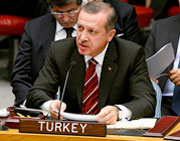 In the aftermath of the Arab awakenings, Turkey has emerged as a serious Middle East power player. Prime Minister Recep Tayyip Erdogan’s frequent travels in the region and his rhetoric underline Turkey’s growing confidence and importance.
In the aftermath of the Arab awakenings, Turkey has emerged as a serious Middle East power player. Prime Minister Recep Tayyip Erdogan’s frequent travels in the region and his rhetoric underline Turkey’s growing confidence and importance.
However, many of Turkey’s actions reflect its own economic and political interests. Turkey was quick to apply pressure rhetorically on the Tunisian and Egyptian leadership to step down, but was more muted on Syria and Libya where key Turkish interests were at stake.
Key Conclusions
Whether Turkey can serve as a model for countries in the region undergoing transition and at the same time promote its foreign policy as a source of stability has yet to be fully assessed. Turkey’s newfound leadership role can have positive effects for regional stabilization and democratization if it is able to address and openly debate its domestic challenges.
While Turkey’s foreign policy has been a source of considerable attention, there is a need to refocus on promised constitutional reform and further development of democratic governance in Ankara. Furthermore, significant challenges remain for Turkey to overcome the longstanding tensions in Cyprus as well as in the Kurdish region before Ankara can fully-assume its role as leader and model for its neighborhood.
Analysis
Turkey’s charismatic and popular Prime Minister personifies the country’s emergence on the international scene as a transregional leading power. His recent traveling schedule included a humanitarian visit to Somalia, where he highlighted the Horn of Africa’s crisis as being part of Turkey’s new foreign policy purvey; a victorious tour of the “Arab Spring” capitals in Cairo, Tripoli, and Tunis where he was greeted as the most popular Middle Eastern leader; and a triumphant speech at the UN General Assembly, where he proclaimed Turkey’s strong support for a Palestinian state as a “moral responsibility” for a power at the “center of international change.” This would have been unthinkable in any other moment in modern Turkish republican history, and he is clearly a man on a mission for his country.
Turkey’s emergence as a self-confident international actor that not only demands global attention, but aims to shape a global agenda focused on the wide region stretching from the Balkans to North Africa represents a new equilibrium for a country once most known for its strong transatlantic link and dogmatic pursuit of European Union recognition as a “Western” power. Turkey’s rebalancing has already caused waves as the perennial questions about Turkey’s “axis shift,” and “where is Turkey going?” debates have been renewed in Western capitals. Western observers are accustomed to assessing Turkey’s behavior through the prism of convergence with or divergence from Western policies and preferences without a critical assessment of Turkey’s own agenda in its regions.
As a regional power preeminently focused on building stability and expanding its influence in its region—and one that sees democratic change as a way to serve these primary goals—Turkey has selectively engaged with its neighbors. It has remained notably silent on the need for political change in Iran (although more critical voices are now being heard)—an important economic partner and a neighbor of Turkey. It has been slower than the rest of Western countries on pushing for change in Gaddafi’s Libya and Assad’s Syria, where Turkish economic and political interests were deeper and more concentrated. On the other hand, the Turkish government has outpaced Europeans and Americans in asking for Tunisians and Egyptians leaders to step down earlier this spring.
Turkey never discusses the presence of the Turkish army in northern Cyprus, while it condemns Israel’s occupation of Palestinian territories. And though Prime Minister Erdogan embraced Palestinian President Abbas’ “Palestinian Spring,” he probably would not accept the notion of a Kurdish Spring. Kurds in Turkey’s South East have repeatedly been promised changes at home, but very little has been delivered. And while Prime Minister Erdogan embraced Somalia’s humanitarian and moral causes, he has been silent on Sudanese President Omar al-Bashir’s charges of crimes against humanity and war crimes for his role in orchestrating Sudan’s abusive counterinsurgency campaign in Darfur. These contradictions reflect Turkey’s different national and security interests.
In addition, the fragility of the democratization process makes the “Turkish model” still quite weak. Indeed, it is premature for Western powers to promote such a model for the Arab countries in transformation. The “Turkish model” is still very much in the making. The plans to reform the Turkish Constitution, dating back to the 1980s, will be a test for the new Turkish leadership, and include progress in media freedom, gender equality, protection of minorities, and, more broadly, the rule of law. Whether Turkey will develop into a more liberal type of democracy, with a strong multiparty system and real alternation of power between different political parties, and with effective checks and balances, is more important to the future of its foreign policy and the cooperation with the West than the particular balance struck between its regional engagements.
Turkey’s newfound leadership role and Prime Minister Erdogan’s international travel can also make the country a more responsible stakeholder in bringing about regional stability and long-term democratization. This is possible if the contradictions within the Turkish system are not brushed aside with political rhetoric, but engaged as part of a healthy policy debate in Ankara. At a moment when Western leadership in the region is being questioned, the timing is right to encourage the emergence of Turkey’s leadership within the framework of liberal democratic competition.
Joshua W. Walker is a Transatlantic Fellow at the German Marshall Fund




